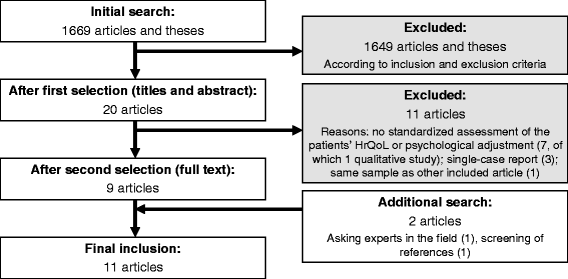Quality of life, psychological adjustment, and adaptive functioning of patients with intoxication-type inborn errors of metabolism - a systematic review
- PMID: 25344299
- PMCID: PMC4219016
- DOI: 10.1186/s13023-014-0159-8
Quality of life, psychological adjustment, and adaptive functioning of patients with intoxication-type inborn errors of metabolism - a systematic review
Abstract
Background: In recent decades, considerable progress in diagnosis and treatment of patients with intoxication-type inborn errors of metabolism (IT-IEM) such as urea cycle disorders (UCD), organic acidurias (OA), maple syrup urine disease (MSUD), or tyrosinemia type 1 (TYR 1) has resulted in a growing group of long-term survivors. However, IT-IEM still require intense patient and caregiver effort in terms of strict dietetic and pharmacological treatment, and the threat of metabolic crises is always present. Furthermore, crises can affect the central nervous system (CNS), leading to cognitive, behavioural and psychiatric sequelae. Consequently, the well-being of the patients warrants consideration from both a medical and a psychosocial viewpoint by assessing health-related quality of life (HrQoL), psychological adjustment, and adaptive functioning. To date, an overview of findings on these topics for IT-IEM is lacking. We therefore aimed to systematically review the research on HrQoL, psychological adjustment, and adaptive functioning in patients with IT-IEM.
Methods: Relevant databases were searched with predefined keywords. Study selection was conducted in two steps based on predefined criteria. Two independent reviewers completed the selection and data extraction.
Results: Eleven articles met the inclusion criteria. Studies were of varying methodological quality and used different assessment measures. Findings on HrQoL were inconsistent, with some showing lower and others showing higher or equal HrQoL for IT-IEM patients compared to norms. Findings on psychological adjustment and adaptive functioning were more consistent, showing mostly either no difference or worse adjustment of IT-IEM patients compared to norms. Single medical risk factors for HrQoL, psychological adjustment, or adaptive functioning have been addressed, while psychosocial risk factors have not been addressed.
Conclusion: Data on HrQoL, psychological adjustment, and adaptive functioning for IT-IEM are sparse. Studies are inconsistent in their methodological approaches, assessment instruments and norm populations. A disease-specific standard assessment procedure for HrQoL is not available. Psychosocial risk factors for HrQoL, psychological adjustment, or adaptive functioning have not been investigated. Considering psychosocial variables and their corresponding risk factors for IT-IEM would allow evaluation of outcomes and treatments as well as the planning of effective social and psychological interventions to enhance the patients' HrQoL.
References
-
- Brusilow S, Maestri NE. Urea cycle disorders: diagnosis, pathophysiology, and therapy. Adv Pediatr. 1996;43:127–170. - PubMed
-
- Chuang DT, Shih VE. Maple syrup urine disease (branched-chain ketoaciduria) In: Scriver CR, Beaudet AL, Sly WS, Valle D, editors. The Metabolic and Molecular Bases of Inherited Disease. Volume II. 8. New York: McGraw-Hill; 2001. pp. 1971–2005.
Publication types
MeSH terms
LinkOut - more resources
Full Text Sources
Other Literature Sources
Miscellaneous


